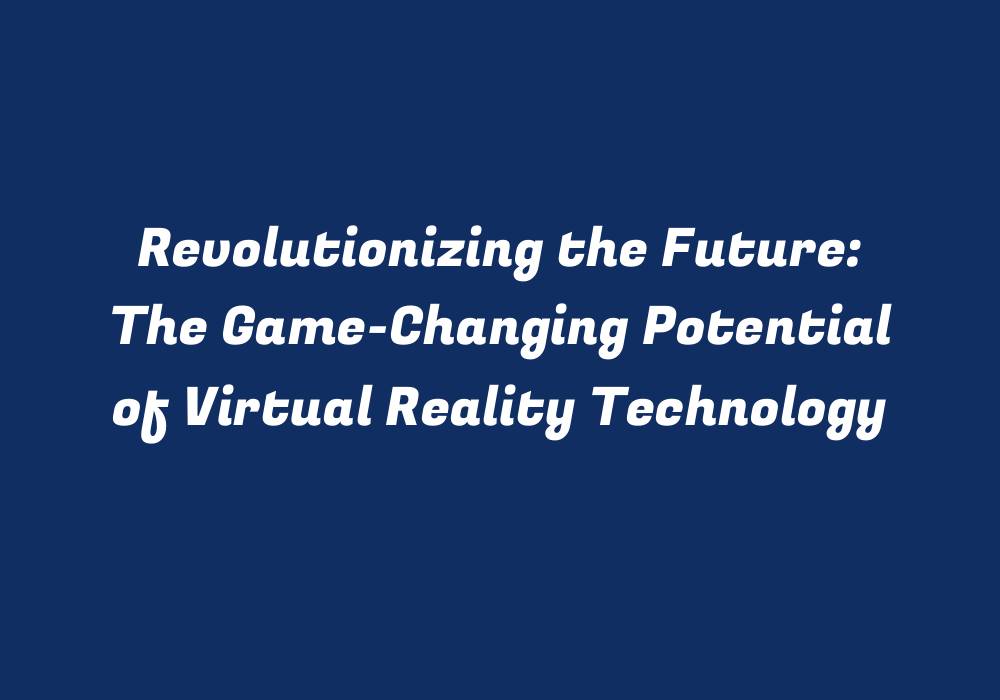Introduction
Virtual Reality (VR) is rapidly changing how we perceive, experience, and interact with our environment. This groundbreaking technology holds the potential to reshape various industries by transforming the way information is received, creating immersive experiences, enhancing learning processes, and improving human connections. In this article, we will delve into the game-changing aspects of VR technology and its significant impact on diverse sectors of society.
Education and Learning
VR has a remarkable influence on education by providing unique learning experiences that go beyond traditional classroom environments. This innovation can potentially transform teaching methods, making complex concepts more comprehensible for students of all ages. Virtual labs, simulations, and 3D visualizations enable educators to create immersive content that stimulates critical thinking, retention, and problem-solving skills.
Healthcare and Medicine
In the healthcare sector, VR technology is revolutionizing patient care, treatment planning, and surgical procedures. For example, virtual reality can be used to create 3D representations of anatomical structures, enabling more precise pre-surgical planning and better outcomes for patients. Moreover, it has the potential to alleviate pain, anxiety, and stress by transporting patients to a relaxing environment during treatment processes.
Architecture and Urban Planning
VR technology is transforming architectural design by allowing architects and engineers to create realistic 3D models of proposed structures. It also enables clients and stakeholders to experience their building project in virtual environments before construction begins, reducing costs associated with rework or errors and ensuring a better understanding of the final product. Moreover, VR simulations can help in analyzing traffic flow patterns, optimizing urban planning, and improving overall city infrastructure.
Entertainment and Gaming
Virtual Reality has significantly impacted the entertainment industry by bringing a new level of immersion to gaming experiences. The development of high-quality VR headsets and advanced graphics technology have led to the creation of virtual worlds that blur the line between reality and fiction. Gamers can now dive into these fully immersive environments, leading to an enhanced sense of presence and providing an unparalleled level of interactivity.
Military Training
The military has been quick to adopt VR technology for training purposes due to its numerous advantages. By simulating various combat situations and conditions, soldiers can experience realistic scenarios without putting their lives at risk. This innovative approach enables them to practice complex maneuvers, sharpen their decision-making skills, and gain valuable experience in high-pressure environments before facing actual combat.
Social Interaction
VR technology has the potential to revolutionize social interactions by allowing people to connect with others from around the world. With virtual reality spaces where users can create avatars and engage in conversations, it is possible for individuals from diverse cultures and backgrounds to come together, share ideas, and form stronger connections that transcend geographical boundaries.
Environmental Conservation
VR can contribute to environmental conservation efforts by providing a more immersive understanding of ecosystems and the impact of human activity on our planet. By simulating various environmental scenarios, VR technology can encourage individuals to develop a stronger connection with nature and promote environmentally conscious behavior in everyday life.
Conclusion
Virtual Reality technology has the power to revolutionize numerous industries and aspects of society. From enhancing learning processes in education to transforming patient care in healthcare, VR offers unprecedented opportunities for growth and innovation across various sectors. As this groundbreaking technology continues to evolve, it will undoubtedly leave a profound impact on our collective future experiences and interactions.
References
- Virtual Reality in Healthcare: Therapy, Surgery and More Applications
- How Virtual Reality Is Changing Architecture’s Future
- How Virtual Reality Is Changing the Way We Game and Train Our Minds
- How VR Is Set to Change Military Training Forever
- How Virtual Reality Can Help Us Connect Across Cultures and Borders, But Must Overcome Obstacles
- Immersive virtual reality can elicit environmental concerns and pro-conservation behavior in a museum setting
